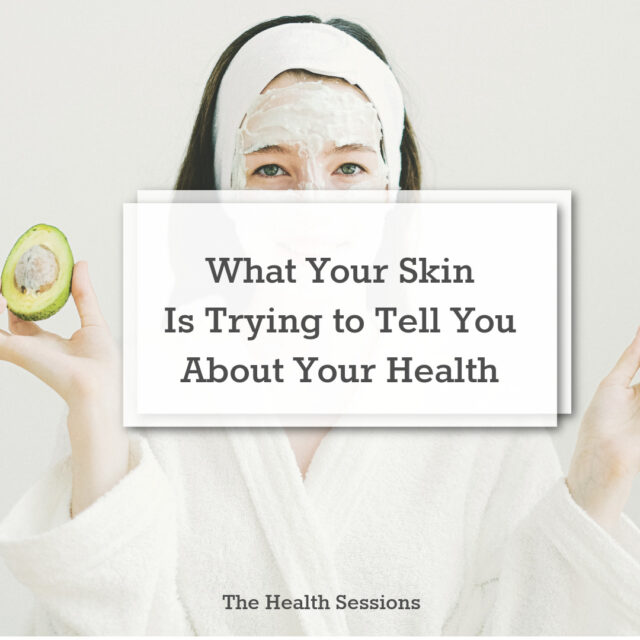6 Eco-Friendly Actions That Directly Impact Your Health

Your skin can tell a lot about your health. From the dark circles that appear under your eyes when you don’t get enough sleep, to the pesky breakouts that form as a result of too many sweets, your complexion is a direct reflection of the way you take care of your mind and body. That’s why it’s so important to be aware of all the not-so-obvious wellness secrets your skin is trying to reveal to you and your health and ultimately, create healthier lifestyle habits for you and your body’s unique needs as you head into the new year.
Whether it’s a hormonal imbalance, nutritional deficiency, or another particular sensitivity, almost every skin condition or concern that surfaces on your skin has an underlying meaning relating to your health. Below, we break down some of the most common tell-tale signs that your skin and face may use as a way to communicate with you about your well-being. Read on to learn what it may be trying to tell you!
Deciphering the differences between hormonal acne and stress acne can be challenging as both types of blemishes occur in response to an irregular fluctuation of hormones. Luckily, there are a few ways to spot the differences. The first being that hormonal acne usually forms on the chin or jawline of your face and arises only periodically as a result of natural bodily changes such as puberty or your monthly menstrual cycle.
Stress acne, on the other hand, is generally more sporadic and tends to form on the oiliest parts of your face, like your T-zone area. The formation of these blemishes comes from an increase in cortisol levels, which work to trigger oil production in your skin, and consequently cause flare-ups to occur.
If you’ve recently been feeling overwhelmed with anxiety, chances are, stress is to blame for your recent breakouts. Fortunately, this concern can easily be managed with stress-reducing activities such as meditation, yoga, and deep breathing exercises. Practicing mindfulness, in an addition to adding a few customizable acne treatments your current skin care regime, should get you back on track to a clean, clear complexion in no time!

We’ve all experienced chapped, cracked lips at one point or another, but for those of us who have an underlying iron deficiency, you may be more acquainted with a specific type of cracking— formally known as angular cheilitis— which works to exclusively attack the corners of your mouth.
Believe it or not, iron deficiency is more problematic than you think. In fact, this is the most common micronutrient deficiency worldwide! Seeing how iron is thought to be one of the most important micronutrients in our diet, it’s critical that you pay attention to the signs and take action accordingly to treat this deficiency as well as this skin concern.
To do this, the best thing you can do is to meet with a doctor. Although you can combat this issue by consuming certain foods in your diet or by using other basic over-the-counter vitamins and supplements, it’s still a good idea to learn about the severity of the problem first. Certain extremes may require special medical attention, so don’t skip out on seeking advice from an expert first. As for treating angular cheilitis, try using an advanced therapy healing ointment like Aquaphor for your chapstick as this will serve to soothe and medicate the lips.
If your zits typically form around your mouth and nose, you may be dealing with a digestive issue. In an article written by Mind Body and Green, skin expert Celestyna Brozek, helps to explain the meaning behind this distinguishable blemish type. He states, “Acne like this can indicate digestive inflammation, stomach hypoactivity or food sensitivities.” Needless to say, it’s imperative that those of you struggling with the formation of this acne pay close attention to the foods you’re fueling your body with and take the proper steps to improve your diet.
Pinpointing what foods or drinks are causing this skin concern to appear is easier said than done, but the first step in the right direction is to follow a process of elimination. Most commonly, gluten, alcohol, sugar, and dairy are responsible for acne and the development of digestive issues, so you may want to consider starting with these food groups first, and slowly, work your way down the line.
This doesn’t mean you have to go cold turkey and remove all of them at once. It simply means that you should try and determine your dietary restrictions by eliminating one of these food groups at a time, allowing for at least a few weeks to pass before making your final assessment and eliminating another food group from your diet. This way you can ensure you adequately assess each of these food groups correctly and the role they may or may not play in your digestive system, skin/face, and overall health. Use this information to guide you on the path to healthy-living and then learn these new strategies to get variation in your diet.
It’s one thing to experience dryness during the wintertime, as this season is normally accompanied by low humidity levels and a drop in temperature, but it’s another to experience chronic dryness of the skin. Very itchy or dry skin can be an indicator of a hormonal health issue like an underactive thyroid.
Hypothyroidism— the fancy term used to describe low levels of the thyroid hormone— can be hard to detect in the early stages of development, but as the issue progresses, the symptoms will become much more noticeable, altering not only the texture and quality of your skin, but also other areas of your health. It can impact your heart rate, body temperature, and even some aspects of your metabolism.
The severity of symptoms will only worsen as this thyroid hormone issue remains untreated, so don’t try and relieve the skin symptoms you experience by yourself. While you may benefit from investing in hydrating skin care products that serve to replenish your natural moisture barrier, it’s more essential that you focus on treating the root of the issue as this will allow you to overcome hypothyroidism more quickly. That being said, if you’ve begun to experience chronic dryness of your skin or any other symptoms associated with an underactive thyroid, be sure to consult with a healthcare professional right away.

Common skin problems like acne, dark circles, minor rashes or cracked lips can be a warning sign of underlying hormonal imbalances, nutritional deficiencies or food and chemical sensitivities. Identifying the root cause of your skin issues not only helps you to tackle them most effectively, but it may also stop slumbering health problems from worsening.
What is your skin trying to tell you about your health?
If you enjoyed reading this article, you might also like: